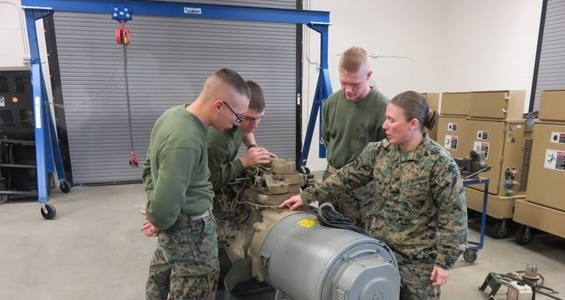Marine Corps Engineer Equipment Electrical Systems Technician (MOS 1142) repair electric motors, motor control circuits, electronic modules and electric power generation equipment.
Engineer Equipment Electrical Systems Technician will troubleshoot, repair and provide maintenance to various electrical systems.
Marines in this MOS will use knowledge of electrical theory and concepts to make repairs and work on various generator systems.
Related Article – Marine Corps MOS List + ASVAB Scores: Details on all 123 Jobs
Qualifications and Training
To enter into this MOS recruits must first take the ASVAB test and score at least a 105 on the Mechanical Maintenance (MM) portion plus a 100 on Electronics (EL).
To enter into the Marines, individuals must be between the ages of 17 and 28, be a legal resident and possess a High School Diploma.
The Marines have strict height, weight and body fat standards that each individual will need to meet prior to leaving for training.
Recruits will be asked to pass all physical examinations including the Physical Fitness Test and Combat Fitness Test.
They will then attend and must graduate from recruit training at either Marine Corps Recruit Depot Parris Island or Marine Corps Depot San Diego.
Recruit Training is 13 weeks and is known as one of the hardest recruit training in the Military, testing you both physically and mentally.
After recruit training, individuals will complete the Basic Engineer Equipment Electrical Systems Technician Course (MO3UAA2), Marine Corps Engineer School in Camp Lejeune, NC.
Related Article –Marine Corps Electrician (MOS 1141): Career Details
What Does a Marine Corps Engineer Equipment Electrical Systems Technician Do?
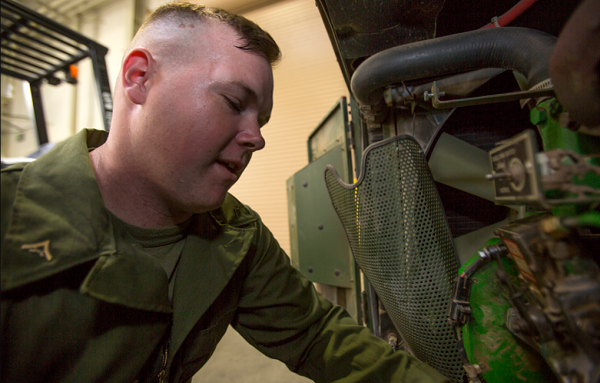
Marine Corps Engineer Equipment Electrical Systems Technician complete troubleshooting, repairs and maintenance.
A large portion of their work may be on repairing generators, and they are sometimes referred to as generator mechanics.
Engineers complete troubleshooting on potential issues with electrical systems.
They will troubleshoot digital and logical components and circuits.
To troubleshoot, diagnose and repair an issue, Technicians will use manuals, schematic diagrams, blue prints and other specifications.
Technicians will also use hand tools and power tools in addition to electrical and electronic test equipment to make repairs.
These Marines make both organizational and intermediate level repairs.
These repairs are on engineer and general supply equipment electrical systems.
Some repair tasks may include soldering connections or replacing wires, malfunctioning apparatus and any components.
They will both create and repair circuits.
The Technician will repair faulty mechanical, hydraulic and pneumatic parts.
Once individuals reach Corporal through Staff Sergeant, they can receive additional training towards job duties.
The advanced training is through the Advanced Engineer Equipment Electrical Systems Technician Course.
This training provides knowledge of Combat Operations Center Integrated Trailer/ECU/Generator.
It also teaches about the interaction between electrical and hydraulic systems on Material Handling Equipment.
Marines learn how to reprogram fault codes and parameter controls on Tactical Quiet Generator sets.
Working on electrical controls of refrigerant systems and heater elements of Environmental Control Units and Containerized Batch Laundry Units are skills that are learned as well.
Soldiers in this position will perform preventative maintenance and document maintenance/repair activities.
A typical day in this position when not deployed, generally consists of steady hours and varying job duties depending on the issues that need to be fixed.
This position can have slow days or fast-paced days and can require team-work or individual job tasks.
When deployed, the hours become less steady and they can be relied on to fix complex issues on their own.
Related Article – Air Force Electrical Systems (3E0X1): Career Details
What Does a Marine Corps Engineer Equipment Electrical Systems Technician Get Paid?
Like other branches of the Military, Marines are paid based on rank.
For those who are recruited into this position, they can expect to start out around $1800 a month in base pay.
As training is complete, and rank is increased, so will the pay.
According to Indeed, the average pay for an Equipment Engineer is around $23,000 annually.
Follow the table below for Marines base pay.
| Insignia | Pay Grade | Rank | Abbreviation | 2023 Minimum Monthly Pay |
|---|---|---|---|---|
| E-1 +4 months | Private | Pvt | $1,917.60 | |
| E-2 | Private First Class | PFC | $2,149.20 | |
| E-3 | Lance Corporal | LCpl | $2,259.90 | |
| E-4 | Corporal | Cpl | $2,503.50 | |
| E-5 | Sergeant | Sgt | $2,730.30 | |
| E-6 | Staff Sergeant | SSgt | $2,980.50 | |
| E-7 | Gunnery Sergeant | GySgt | $3,3445.80 | |
| E-8 | Master Sergeant | MSgt | $4,957.20 | |
| E-8 | First Sergeant | 1stSgt | $4,957.20 | |
| E-9 | Master Gunnery Sergeant | MGySgt | $6,055.50 | |
| E-9 | Sergeant Major | SgtMaj | $6,055.50 | |
| E-9 | Sergeant Major Of The Marine Corps | SgtMaj | $6,055.50 |
Benefits
The Marines provide benefits in addition to the pay above.
Benefits include insurance, retirement and sick time.
The Marines also provide paid housing.
Tuition assistance opportunities are available to Military members.
Job Reviews
Marines who reviewed this position discussed valuable skills learned and mentioned it being a rewarding experience.
Reviews from people who have previously held this position, recommend the position and generally rate it 4/5.
Positive reviews discuss being able to mentor others, the opportunities for travel and vacation time.
Negative reviews state that this position, or the Military in general, can be a difficult job when you have a family.
Long working hours and deployments add to that issue.
The review below provides more information on positive aspects and job functions.
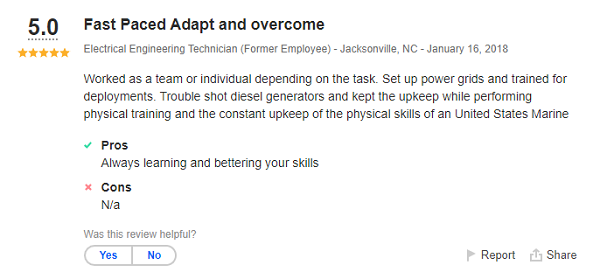
The two reviews below show the culture and experiences gained from this position.
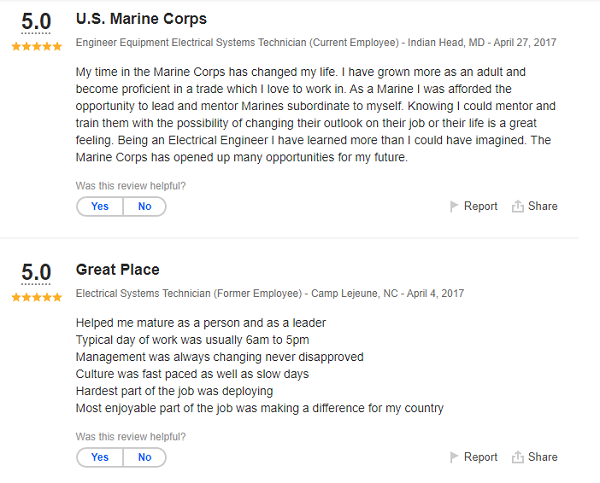
Related Article – Marine Corps Infantry Assault (MOS 0351)
Civilian Career Opportunities
Working as an Engineer Equipment Electrical Systems Technician allows individuals to gain experience in electrical systems.
With this experience, Marines can find positions as Electric Motor Repairers, Electrical and Electronic Equipment Assemblers, Electricians and Electrical Engineers.
Some of these positions require additional training and the Marines offer apprenticeship programs through the United States Military Apprenticeship Program that assists with those additional training requirements.
Apprenticeship programs are available that specifically relate to civilian positions as electricians and Electrical Engineering Technicians.
Summary
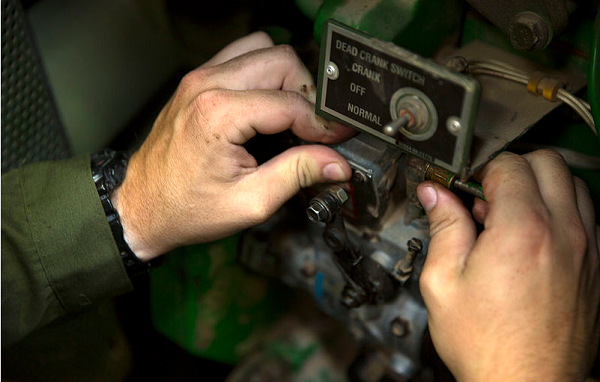
Marine Corps Engineer Equipment Electrical Systems Technician (MOS 1142) use electrical theory and concepts to make repairs on electrical systems.
Technicians troubleshoot, diagnose, repair and maintain electrical components, parts and equipment.
This position requires individuals to pass strict physical examinations, recruit training and course work.
Marines will be paid based on rank and will receive benefits.
Reviews of this position are positive, with most Marines recommending the position for the skills learned and the experience gained.
Working in this position allows individuals to gain skills related to Electrical Engineer and Electrician work as a civilian.
Related Article –Logistics/Embarkation Specialist (MOS 0451)
References
Indeed Marine Corps Engineer Wages
- 5 Best Jobs for Female Marines - June 20, 2024
- 10 Best Marine Corps Recruiting Videos of All Time - June 20, 2024
- Marine Corps Requirements - June 20, 2024

